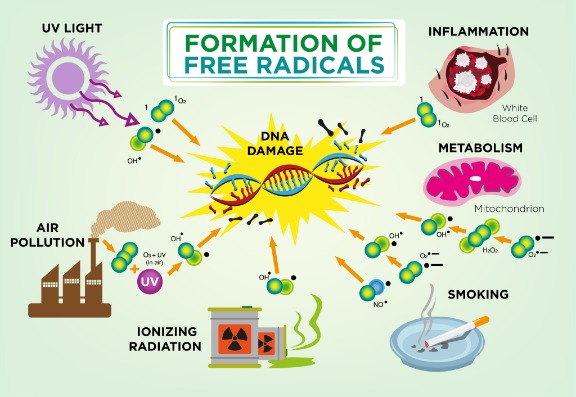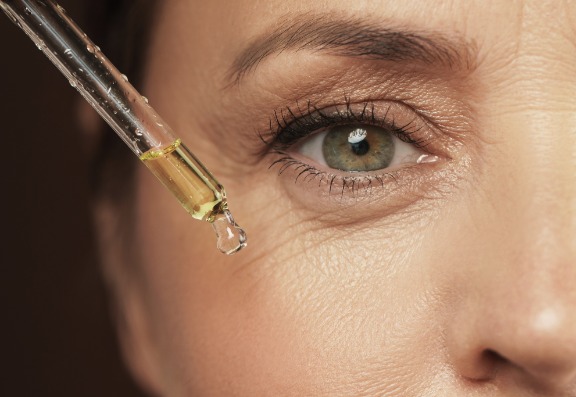
14
Mar
2013
‘Antioxidants’ is one of the biggest buzzwords in skincare these days. I get countless questions about them in the clinic every day. There seems to be a lot of confusion about what exactly antioxidants are and how they should be used. So I have summarised the most important facts about antioxidants here:
What is an antioxidant?
Antioxidants are substances, which can neutralise free radicals. By neutralising free radicals, they prevent a harmful reaction called the oxidative chain reaction. Antioxidants in skincare, therefore, reduce ‘oxidative stress' in the skin, help to prevent damage and thus reduce the risk of premature skin ageing and possibly even skin cancer
What are free radicals & oxidative stress?
Free radicals (‘reactive oxygen species’ – ROS) are highly reactive molecules, which contain at least one unpaired electron. Free radicals thus constantly seek electrons from other molecules and start a chain of oxidative reactions in the skin (‘oxidative chain reaction’). This leads to disruption of normal cell function and damage to our cells, especially when in a high concentration (‘oxidative stress’). Cells might become mutated, defective or killed as a consequence of free radical damage.
Free radicals are generated as by-products from normal cellular metabolism. However, free radicals can be increased in number by sun exposure, smoking, pollution and other internal and external factors.

How can free radicals damage our skin?
Free radicals contribute to the skin’s ageing process by damaging lipids, proteins and nucleic acids in our skin. Free radicals also cause inflammation, reduce collagen and elastin production and increase collagen and elastin breakdown in the skin. In addition, free radicals also play a role in skin cancer.
How important are antioxidants in the fight against skin ageing?
They play a significant role. There are a variety of mechanisms involved in skin ageing including shortening of DNA telomeres, mutations in mitochondrial DNA with subsequent mitochondrial dysfunction, formation of advanced glycation end products (AGEs) and last but not least free radical damage of lipids, proteins and nucleic acids in our skin.
Where are antioxidants present?
Antioxidants are present everywhere in our bodies. The skin also contains a variety of different antioxidants. Antioxidants can be divided into enzymatic antioxidants such as glutathione and low-molecular-weight antioxidants such as vitamin C, vitamin E and ergothioneine. Both types of antioxidants are present in our skin.

How do antioxidants work to combat ageing?
Antioxidants help to prevent a number of harmful ageing processes revolving around free radicals.
These contribute to the skin’s ageing process by causing inflammation, reducing collagen & elastin production and increasing collagen & elastin breakdown in our skin.
Our skin will try to repair the damage, but this might happen sub-optimally so that with time damage will accumulate and the quality of collagen and elastin fibres will be reduced.
This ultimately leads to poorer skin elasticity with the development of lines and wrinkles. Using anti-oxidants will reduce the rate at which this takes place.
How effective are antioxidants in skincare?
That depends largely on the specific product. There are countless factors influencing whether a skincare product really will deliver, but a good antioxidant product should certainly be included in everybody’s daily skincare routine, as a good product will greatly contribute to protecting the skin from premature skin ageing. Some antioxidants work particularly well in concert, as they recycle each other, e.g. vitamin C and E.
What other ingredients are important if we want to have youthful looking skin?
Although antioxidants are crucial and should be present in everybody’s daily skincare routine, antioxidants should not be the only active ingredient you use, if you serious about combating skin ageing. A good vitamin A derivative for example (e.g. retinol or retinaldehyde) is also important. And of course you should always use a broadspectrum sun protection moisturizer with SPF 30-50 all year around.
What would your top three anti aging products be? And do any of these include antioxidants?
am:
1.) Antioxidant serum:
e.g. Skinceuticals’ CE Ferulic for normal skin, Phloretin GEL for dry, sensitive skin and Phloretin CF serum for oily to combination skin.
2.) Broadspectrum sun protection moisturizer:
e.g. Skinceuticals Sheer Mineral Defense or Heliocare Gel, both SPF 50.
pm:
3.) Vitamin A derivative containing product:
e.g. Avene’s Ystheal+ for normal skin, Skinceuticals’ Retinol 0.3-0.5 for combination to oily skin or Avene’s Eluage cream for dry skin.
If you want to read more, the experts at Consulting Room really know what they're talking about and have put together some skincare, lines and wrinkles and sunscreen FAQs just for you.
If you have more questions, you can use the skincare, lines and wrinkles and sunscreen question feature to talk to our panel of trained medical experts.
If you're keen to know more about sun protection right away then you're in luck - those clever folks also have a list of trusted, accredited skincare, lines and wrinkles and sunscreen clinics in your area.
Ellanse vs polynucleotides: An expert skin doctor clarifies the distinctive differences...
Whether you're in your twenties combatting breakouts or seeking to address and prevent fine lines, iS Clinical has tailored a solution for you..
There are many ways that menopause can affect the skin. Let's talk to an expert...
Hey, wait!
Before you go.....
Let's stay in touch, pop your details here and we'll send our editor's hand-picked updates on your fave subjects.